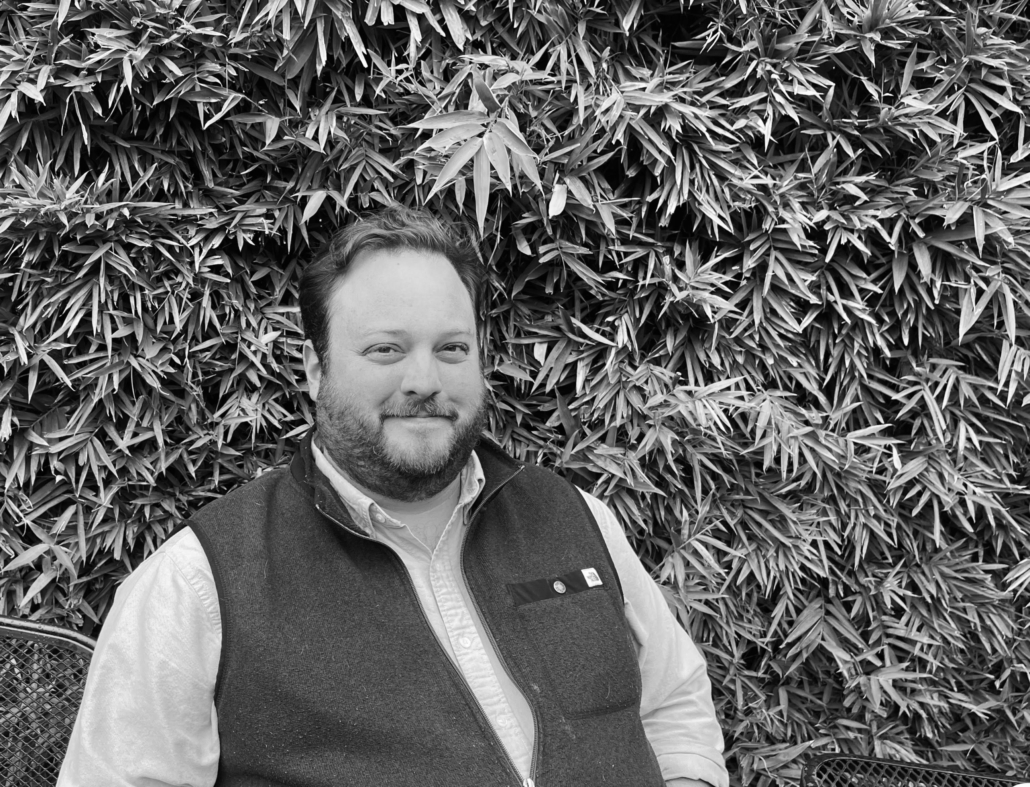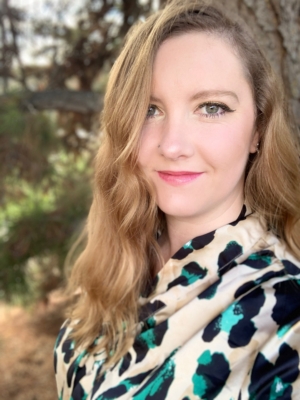Heartwarming, Bittersweet, With a Slap in the Face: C.E. O’Banion on Publishing His Debut Book

C.E. O’Banion is a writer, husband, and father of two living in Baton Rouge, LA. He graduated from LSU with a bachelor’s, LSU Law School with a Juris Doctorate, and he has an MFA from Antioch University Los Angeles. His work can be found in The Southern Review, The Hyacinth Review, The Dead Mule, and more, and he has been a finalist in multiple New Yorker cartoon caption contests. He is a professor at LSU.
C.E. O’Banion’s debut book, Chinese New Year, was published by TBP Press (2023). The novel, “follows Alton B. Tapscott, who battles hurricanes, his children, the trappings of polite society, organized religion, and the inescapable control of technology – his only weapons being his cat, a pair of prescription arthritic socks, and his new Wi-Fi-enabled hearing aid.”
C.E. O’Banion and I discussed book origins, publishing a debut book, and his time as a student at Antioch.
Ashley Russ: Chinese New Year is your debut. Can you share with us this book’s origins?
C.E. O’Banion: The origins come from the life I was living and writing about while I attended Louisiana State University for Creative Writing. I wrote a story about a man wandering around Baton Rouge, where the novel is set. My professor, James Wilcox, liked the story and suggested I continue it. I went to law school instead
I kept working on the book because I felt there was a missed opportunity with it. After law school, I got a publishing contract with a smaller publisher. It grew from there.
I kept working on the book because I felt there was a missed opportunity with it. After law school, I got a publishing contract with a smaller publisher. It grew from there. It was still about an elderly man wandering around Baton Rouge, but then, when I came to Antioch, the pandemic happened, and the publisher went under. That gave me a new lease on the book.
At the time, I worked as the administrator of a nursing home. I was able to take some of that creativity from these situations that were not creative at all, and Chinese New Year is the basis of that. We would [celebrate it] every week for our Alzheimer’s residents.
If there was Christmas that you’re celebrating every week, then [the residents were] looking for their family. If it’s Mardi Gras, same thing. If it’s a religious holiday, that doesn’t really fly because, again, they’re looking for a priest or family to come. So, we [celebrated] Chinese New Year over and over. It got to the point where every day of my life felt like Chinese New Year.
Also, in the book, Alton Tapscott thinks about fatherhood, and if he was a good dad, when one of his kids has thrown him into a nursing home. Which is something that I’m worried about my son doing to me one day.
AR: Can you elaborate on the process of initially writing the book, the different stages that it went through? Because you said it was published and then the publishing house failed.
CEO: The editing process with that one was very tough. It was a lot of back and forth over months and months. It was not a good process for me. I have kids. I was teaching. I was doing all these things.
When they said, we’re not going to be able to publish this, I was pretty devastated. And then I ran into a professor from LSU who said, if you’d like teaching, you should go get an MFA.
Antioch helped me develop the book from a think piece about an old curmudgeon wandering around, trying to get out of his situation—like I was doing. They took it from something where I felt like I had a good product to something that I understood.
I’m still learning a lot [on my] second manuscript. I have an agent for this one, which has been better. And I’m making more headway with some bigger publishers than I had at first. I was happy to get anything the first time, let alone the second time.
Antioch helped me have the confidence that what I had was readable, marketable, and sellable.
AR: We’re friends. There were so many parts where I said, this must have been a real person, or this is totally something I could see Casey saying.
CEO: I’ve never caught a baseball at a baseball game. I’ve been to hundreds of Texas Rangers, Houston Astros games. I’ve never caught one. There is a quote in there about my dad. He has a shirt that says, shut up and drink your beer like you’re in the centerfield bleachers. He loves that shirt. There are little things like that.
We have a friend from college named Tapscott. And it’s a mystery what his first name is. And I think [my character’s] personality is also shaped because I was watching a lot of Frasier.
AR: Your novel is speculative, highly satirical, political, sad, and wholly funny. How do you straddle those lines? Were there ever times you thought you went too far? Or not far enough?
CEO: I would say I come from a fairly left leaning family. Most of my friends are educated white males, who lean slightly more left than right. I’m born and raised in Texas and Louisiana, and I’m in Louisiana. This is where I’ve decided to raise a family, so I’m around these different viewpoints all the time.
Somewhere around 2016, when Trump was elected, I felt this shift from nuanced dislike for different opposing parties in politics to a real hatred.
[One character in Chinese New Year] went to the January 6 insurrection as her vacation. I want her to be very right leaning. She thinks the robots are listening to them. She doesn’t like the two homosexual guys and the French guy. And the French guy represents some things that I saw, either in Antioch, or just in different places. [He’s] that version of left leaning people I think turn off the right, or someone who might be in the middle.
I wanted everybody represented, and I wanted everyone respected.
AR: Can you share what influenced your choice to set this book in the near future? What fears about the future are you writing to address?
CEO: I do some work in oil and gas energy. Energy companies will always be reliant on fossil fuels to a degree. They’re turning a corner and noticing the viability and the need to look into transitional energy.
In South Louisiana, we have more hurricanes now than we used to have. When I got to South Louisiana, when I was 18, we had one every few years. In 2016, around the time when I was really working on the book, and it was just an old man wandering around Baton Rouge, we had a flood that impacted half the city, and Houston flooded soon after. Global warming was a big one.
Something that I think people down here think about a good bit is, how long is this sustainable?
AR: Can you share some of your experiences during your time at Antioch? Who and what were influential in helping you bring this book to life and why?
CEO: Some people that I worked with in my classes were people that I really tried to emulate, like Ahsan Butt and Dan O’Brien. I’ve gotten a lot out of reading other people’s work because of how talented they are.
I really connected with Jim Krusoe and Victoria Patterson. Having somebody that believes in you as a writer is something that everybody deserves and needs. It’s such a boost. When those professors give you notes, and whether the notes are filled with praise or filled with corrections, I felt like a real writer.
The next completed manuscript is better than the novel. These different, you know, mentors that I had are people that just went out of their way and helped me build confidence.
AR: What other moments during your education at Antioch helped you the most?
CEO: I learned a lot about different cultures, different expectations, and people not just from this kind of Western, I would say, Pacific Time Zone. I really enjoyed getting to talk to different people from different walks of life.
I learned a lot about different cultures, different expectations, and people not just from this kind of Western, I would say, Pacific Time Zone. I really enjoyed getting to talk to different people from different walks of life.
AR: Can you share what concerns you had while publishing your debut? How did you address them?
CEO: I wanted one character, Archie, to represent this kind of toxic hustle culture that I saw amongst kids. Winning, you know, became extremely important for these kids, and when I was growing up, it was a thought of plenty [of people]. I would agree, to some extent, that helps teach kids certain things. But, at the end of the day, it’s not a bad idea just to be nice to people.
I think that’s this masculinity that comes through that I don’t represent, or I don’t think anyone looks at me and goes, “There’s an alpha male.” That’s totally fine with me.
I think that there was this fear, is this the best version of me, of this book? Does my publisher have that same drive I do to make this the best possible version of this book? I think it helped that when I woke up, I read the book over and over.
The book was what I made of it. I was proud of it. I would do something a little different next time, but I think for the first experience, I was very lucky to get what I got. So that’s cool.
AR: What advice can you give us about publishing a debut?
CEO: I had two contracts available, one from a university press and one from this indie publisher. Almost everyone I asked said to go with the university press, but the book was going to come out around the end of 2025. I decided I would rather be done in a year.
Just follow your gut. There’s a formula for these query letters people follow, and I follow, too, but I’ve tried to be as much of myself in it as I can. I think it works itself out. Just kept trying.
And to sum it up, it’s all about what you make of it and how strongly you see yourself doing this. Because if it’s strong enough, you’re gonna find the right person.
Once you do, you’re going to find that they’re exactly what you’ve been looking for.
AR: What about fear? What if we’re dragging our feet on publishing our debut book?
CEO: There’s no reason for any of us to be dragging our feet. It’s going to be as exciting and as frustrating as you think it is. Heartwarming. Bittersweet. With a slap in the face.
When it comes out, it’s going to be just as fulfilling as you think. So, let’s just keep doing it.
Ashley Russ is an American writer and educator residing in California. She holds a BFA in Creative Writing from UC Riverside and an MFA in Creative Writing from Antioch University. Her work has appeared or is forthcoming in Antioch’s Lunch Ticket, Sweet Jane Magazine, UC Riverside’s Mosaic Art and Literary Journal, and in Endurance News. You can find her work at https://ashleydruss.com | Twitter @TheWritingRuss. | Instagram: @ashleyrusswriter | Bluesky: @ashleyruss





